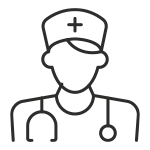Find Your Symptoms, Find Your Care
You have an illness or injury that just can’t wait. Where is the best place for you to receive medical care?
- If it is not an emergency, make an appointment with your primary care physician. This is the most affordable option.
- If it is not an emergency and your primary care physician is not available, try an in-network immediate care center or SRHS Virtual Care.
- In case of an emergency, go to the nearest emergency room. If you are unsure if you can get there on your own, call 9-1-1.

Primary Care Provider
If you aren’t feeling well, your primary care physician is the first person you should contact. A primary care physician knows your medical history, allowing you to build a relationship over time.
Make an appointment with your primary care physician for:
- Lab tests such as liver function, thyroid, hormone levels and cholesterol
- Ongoing medications like birth control
- Chronic conditions such as anxiety, depression, diabetes or high cholesterol
- Referrals to other medical specialists
![]()
Virtual Care
Virtual Care connects you to a healthcare provider in minutes using your computer, tablet or phone. It’s a great option for care where you need it.
The provider will assess your condition, provide a treatment plan and even send prescriptions for an acute problem to your pharmacy if needed, all at a cost beginning at $19.
Use SRHS Virtual Care for:
- Coughs, colds or sore throats
- Cold sores
- Constipation
- Ear pain
- Eye infections/pink eye
- Fevers
- Flu symptoms
- Headaches
- Insect bites
- Mild asthma/allergies
- Minor sports injuries
- Sinus infections or bronchitis
- Skin rashes, poison ivy or infections
- Stomachaches, vomiting or diarrhea
- Urinary tract infections
![]()
Immediate Care Center
For after-hours, weekends or if you can’t make an appointment with your primary care physician, head to the immediate care center for non-life-threatening cases, such as:
- Coughs, colds or sore throats
- Ear pain
- Eye infections
- Minor illness or injuries
- Sprains or strains
- Possible broken bones
- Sports injuries
- Sinus infections
- Urinary tract infections
- Vomiting or diarrhea
![]()
Emergency Department
Call 9-1-1, especially for stroke and heart attack symptoms. Go to the emergency room for life-threatening situations and serious symptoms, such as:
- Chest pain or pressure
- Convulsions or seizures
- Difficulty breathing or choking
- Difficulty speaking, drooping face or numbness of limbs
- Loss of consciousness
- Poisoning
- Severe head, neck or back injury
- Severe bleeding or burns
- Severely broken bones or loss of limb












